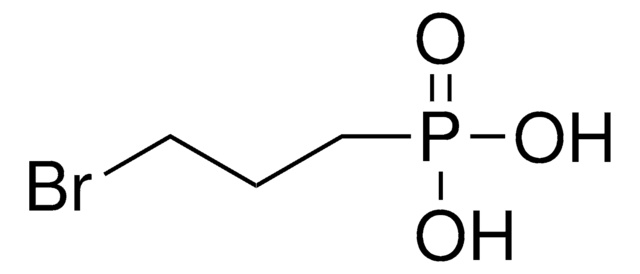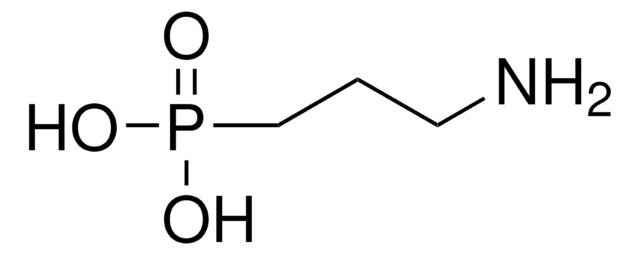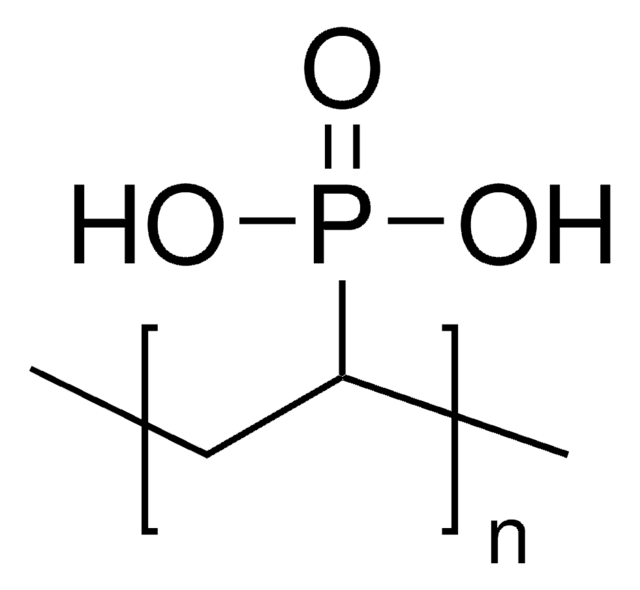745855
12-Mercaptododecylphosphonic acid
95%
Sinonimo/i:
P-(12-Mercaptododecyl)phosphonic acid
Autenticatiper visualizzare i prezzi riservati alla tua organizzazione & contrattuali
About This Item
Formula empirica (notazione di Hill):
C12H27O3PS
Numero CAS:
Peso molecolare:
282.38
Numero MDL:
Codice UNSPSC:
12352103
ID PubChem:
NACRES:
NA.23
Prodotti consigliati
Saggio
95%
Stato
powder
Punto di fusione
92-96 °C
Temperatura di conservazione
2-8°C
Stringa SMILE
OP(O)(CCCCCCCCCCCCS)=O
InChI
1S/C12H27O3PS/c13-16(14,15)11-9-7-5-3-1-2-4-6-8-10-12-17/h17H,1-12H2,(H2,13,14,15)
PVIUMTORLYKRJT-UHFFFAOYSA-N
Descrizione generale
12-Mercaptododecylphosphonic acid (MDPA) is an organophosphonic acid that forms a self-assembled monolayer (SAM). The phosphonic groups tend to react with the metal surfaces that allow the formation of metal-oxygen-phosphonate (M-O-P) bonds that facilitate the surface with mechanical and chemical stability.
Applicazioni
MDPA based SAM can be coated on TiO2 for potential applications in the extraction of heavy metals. It can also be used in surface modification of a graphene oxide (GO) based active material for the fabrication of a organic field effect transistor (OFET).
Organophosphonic acid self-assembled monolayers (SAMs) for nanoelectronics; solid-state lighting; energy generation and nanocomposites. A mercaptoalkylphosphonate monolayer used to bind gold nanoparticles.
Avvertenze
Warning
Indicazioni di pericolo
Consigli di prudenza
Classi di pericolo
Eye Irrit. 2 - Skin Irrit. 2 - STOT SE 3
Organi bersaglio
Respiratory system
Codice della classe di stoccaggio
11 - Combustible Solids
Classe di pericolosità dell'acqua (WGK)
WGK 3
Scegli una delle versioni più recenti:
Possiedi già questo prodotto?
I documenti relativi ai prodotti acquistati recentemente sono disponibili nell’Archivio dei documenti.
I clienti hanno visto anche
Peter J O'Brien et al.
Nature materials, 12(2), 118-122 (2012-11-20)
Manipulating interfacial thermal transport is important for many technologies including nanoelectronics, solid-state lighting, energy generation and nanocomposites. Here, we demonstrate the use of a strongly bonding organic nanomolecular monolayer (NML) at model metal/dielectric interfaces to obtain up to a fourfold
Self-Assembled Monolayers of 12-Mercaptododecylphosphonic Acid on Titania Particles; Application to the Extraction of Heavy Metals
Antherieu S, et al.
MRS Online Proceedings Library, 847(1), 141-149 (2004)
Driving forces for the self-assembly of graphene oxide on organic monolayers
Kirschner J, et al.
Nanoscale, 6(19), 11344-11350 (2014)
Phosphonate monolayers functionalized by silver thiolate species as antibacterial nanocoatings on titanium and stainless steel
Amalric J, et al.
Journal of Materials Chemistry, 19(1), 141-149 (2009)
Randall M Stoltenberg et al.
Langmuir : the ACS journal of surfaces and colloids, 27(1), 445-451 (2010-12-08)
Developing orthogonal surface chemistry techniques that perform at the nanoscale is key to achieving precise control over molecular patterning on surfaces. We report the formation and selective functionalization of alumina nanoparticle arrays generated from block copolymer templates. This new material
Il team dei nostri ricercatori vanta grande esperienza in tutte le aree della ricerca quali Life Science, scienza dei materiali, sintesi chimica, cromatografia, discipline analitiche, ecc..
Contatta l'Assistenza Tecnica.










